Find the perfect camera to capture unforgettable concert moments.
Whether you're a beginner or a professional, having the best cameras for concert photography is essential. It allows you to capture the energy, passion, and excitement of live performances while honing your photography skills.
One camera that stands out for concert photography is the Sony a7 III. With its superfast autofocus, it can track moving subjects with precision, even in near-darkness. This camera has incredibly sharp optics, is compact enough to carry around, and blend in easily with the crowd. It's the perfect combination of quality and convenience.
Let’s start with the most important specs the best concert cameras should have. The device should work great in low light. The camera must have fast autofocus for continuous shooting. It will let you take astonishing photos.
Then look for a suitable lens or even several lenses. Personally, I recommend 24–70mm and 70–200mm lenses with 2.8 aperture. They will help you take high-quality photos of musicians, fans, decorations, etc.
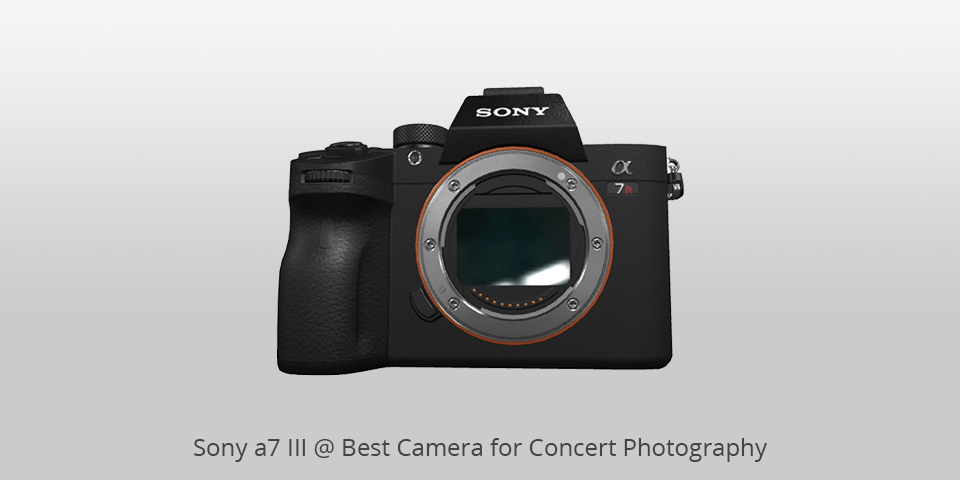
Megapixels: 24.2 MP | Screen Size:3 in | Lens Mount: Sony FE | Video: 4K | Battery Life: 610 shots
One of the standout features of the Sony a7 III is its high-quality sensor for better image quality, less noise, and greater dynamic range. This Sony camera is perfect for concert photography because it can capture vibrant images even in low-light conditions.
The wide ISO range and 693 phase-detect autofocus points covering 93% of the frame make it easy to capture close-ups and group shots. Plus, the burst mode shooting at 10 frames per second is ideal for capturing those fast-moving performers.
Another advantage is the camera's autofocus system. It's fast and precise, able to track subjects even when they're moving quickly on stage. This is crucial for the best camera for concert photography, where musicians are constantly in motion.
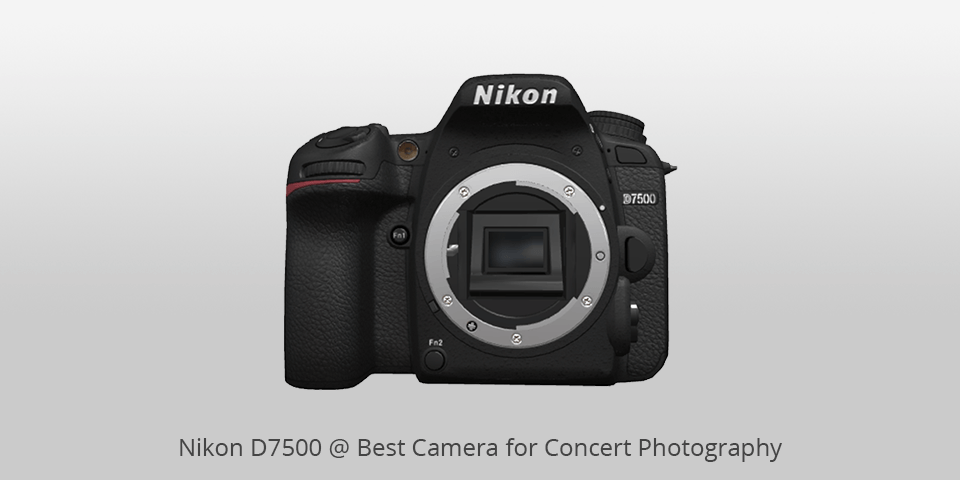
Megapixels: 16 MP | Screen Size: 3.2 in | Lens Mount: Nikon F DX | Video: 4K | Battery Life: up to 950 shots
D7500 has a lightning-fast autofocus system, which is crucial when capturing those high-energy moments during a concert. It keeps up with the fast-paced action and ensures your shots are sharp and in focus. Additionally, its 16-megapixel sensor allows for incredibly detailed images, perfect for zooming in on the performers and capturing all the little nuances.
Another great feature is the camera's ability to handle low-light conditions exceptionally well. Concerts are often dimly lit, but the D7500's wide ISO range and impressive dynamic range ensure you can capture those epic moments without excessive noise or loss of detail.
I also appreciate the burst shooting mode on this camera. It allows you to capture multiple frames of the same scene.
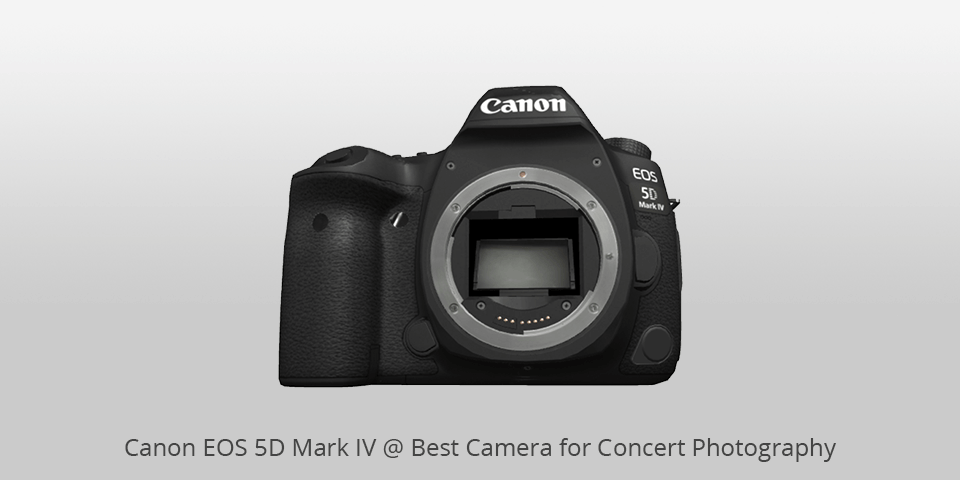
Megapixels: 30.4 MP | Screen Size: 3.2 in | Lens Mount: Canon EF | Video: 4K | Battery Life: 800 shots
This Canon camera is a solid choice for shooting concerts due to its impressive 30.4-megapixel full-frame sensor. This best camera for concerts captures high-resolution images that can be easily cropped without losing quality.
Plus, the camera's low-light performance is pretty impressive, which is crucial for concert photography where lighting conditions can be challenging. With its 61-point autofocus system, the Mark IV locks onto your subject quickly and accurately.
If you prefer shooting in RAW format, the Mark IV has in-camera corrections for peripheral illumination, chromatic aberration, distortion, and diffraction. The camera also offers rear-panel and top-panel exposure displays, giving you full control over your exposure settings.
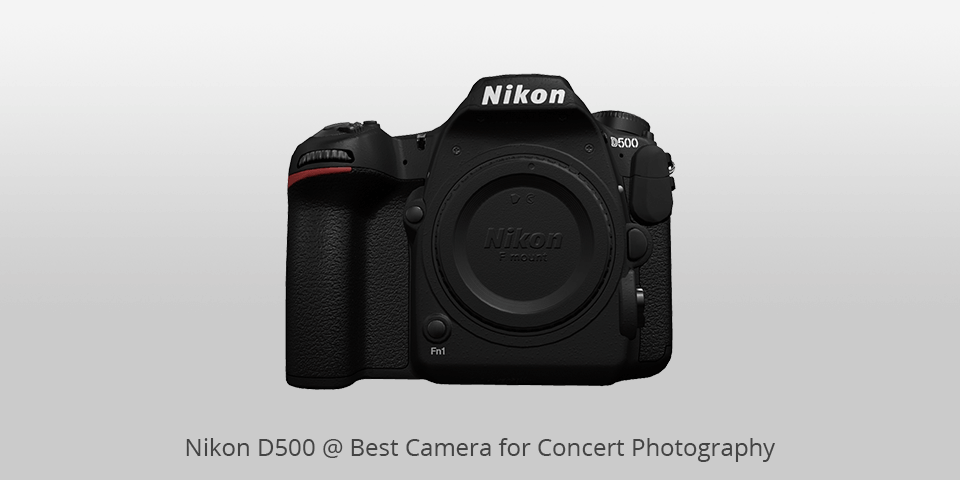
Megapixels: 20.9 MP | Screen Size: 3.2 in | Lens Mount: Nikon F DX | Video: 4K | Battery Life: 700 shots
D500 offers a lot of great advantages for concert photographers. One of its standout features is its high ISO performance, which is crucial for shooting in low-light conditions often found at concerts.
Another major advantage is the quality of its autofocus (AF) system. The D500 has a 153-point all-cross-type AF system that excels in challenging situations, such as capturing moving and low-contrast subjects in dim lighting.
Unlike many other DSLRs, Nikon photography camera uses an optical technology for its electronic display, which means it won't slow down or become noisy in dim light. The viewfinder provides a generous field of view with 100% coverage and 1.0x magnification, allowing for precise framing of your shots.
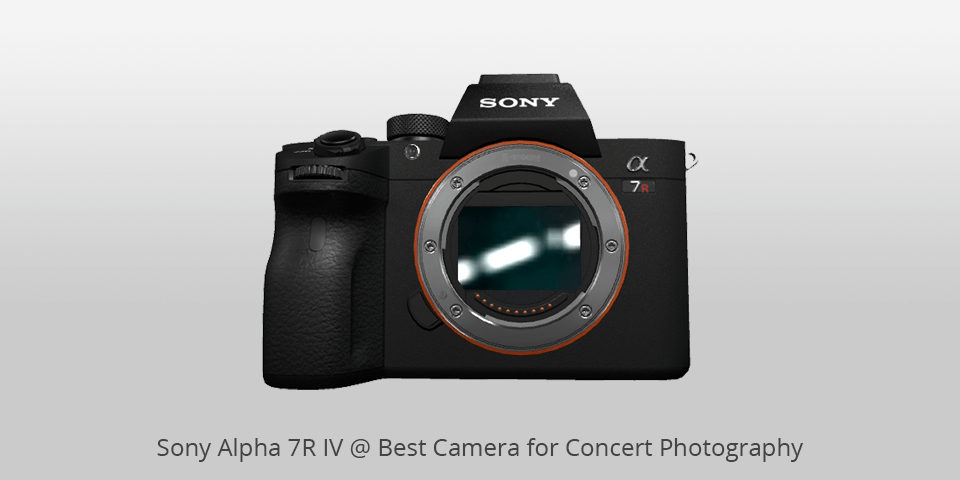
Megapixels: 61 MP | Screen Size: 3 in | Lens Mount: Sony E | Video: 4K | Battery Life: 670 shots
Sony Alpha 7R IV boasts a massive 61-megapixel sensor that captures the intricate details of every performance. This high resolution is a huge plus point, especially when you need to capture the vibrant energy of a concert. Additionally, the camera has a pixel-shift mode that can quadruple its resolution, resulting in stunning 240-megapixel equivalent images.
This best camera for concert photography also comes with lens breathing compensation, which helps reduce any undesirable effects that might occur when focusing. In terms of connectivity, the camera offers a super-speed USB 3.2 connector for quick transfer of large uncompressed RAW files. It can also be remotely triggered using a smartphone and supports live image transmission to connected devices.
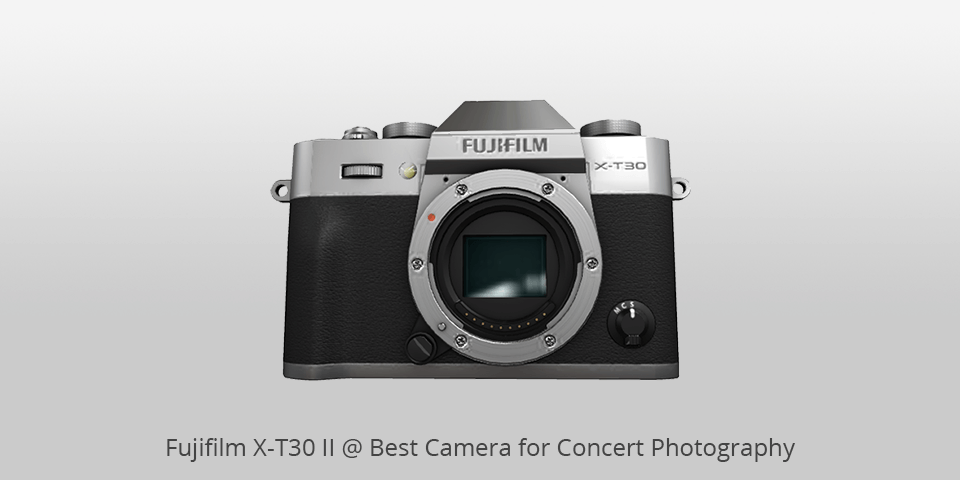
Megapixels: 26.1 MP | Screen Size: 3 in | Lens Mount: Fujifilm X | Video: 4K | Battery Life: 380 shots
One of the biggest advantages of Fujifilm X-T30 II is its versatility and compact size. Concert photography often requires you to be far away from the stage, and the X-T30 II is perfect for that.
Whether you want vivid colors or moody black and white shots, this camera has you covered. With a sensitivity range of ISO 100-32000, you'll have no trouble capturing plenty of detail even when the stage lighting isn't ideal.
Speaking of shooting modes, the this Fujifilm camera has some nifty features tailored for concerts. Continues Autofocus mode is perfect for focusing on a moving subject, like a lead singer, while you press the shutter button. And if your subject is stationary, the Single Servo Autofocus mode will keep it locked on after you press the shutter button.
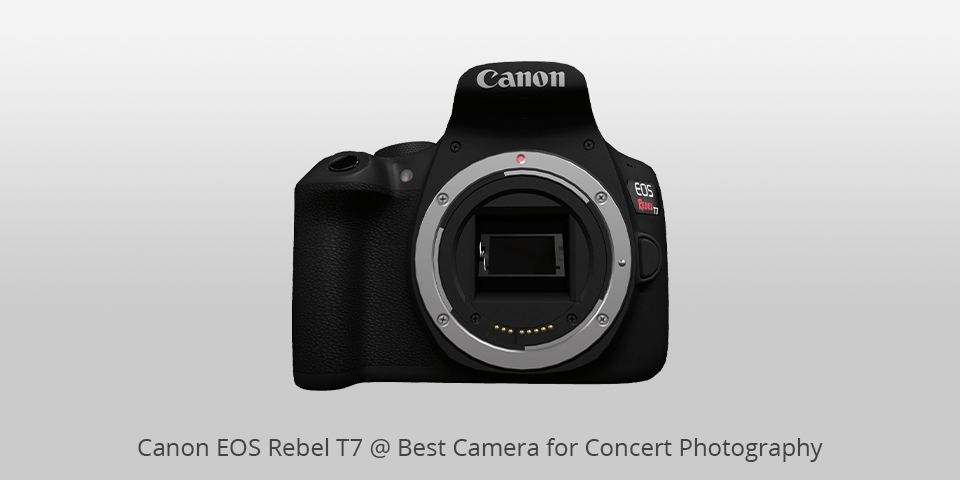
Megapixels: 24.1 MP | Screen Size:3 in | Lens Mount: Canon EF/EF-S | Video: Full HD | Battery Life: 500 shots
Canon EOS Rebel T7 is a great concert camera because it excels in handling challenging lighting conditions and motion blur. Its fast autofocus and burst mode allow you to capture high-energy performances. The camera's APS-C sensor is larger than most competing models, providing better image quality and higher resolution.
It also has a wider dynamic range, allowing for greater detail in both bright and dark areas. A high ISO range is also essential for concert photography, and the T7 delivers in this aspect. This cheap camera allows you to take sharp and clear photos in low light without the need for a flash.
The camera's silent shooting mode is a great feature for quieter events, ensuring you can capture images without disturbing the performers or audience members.
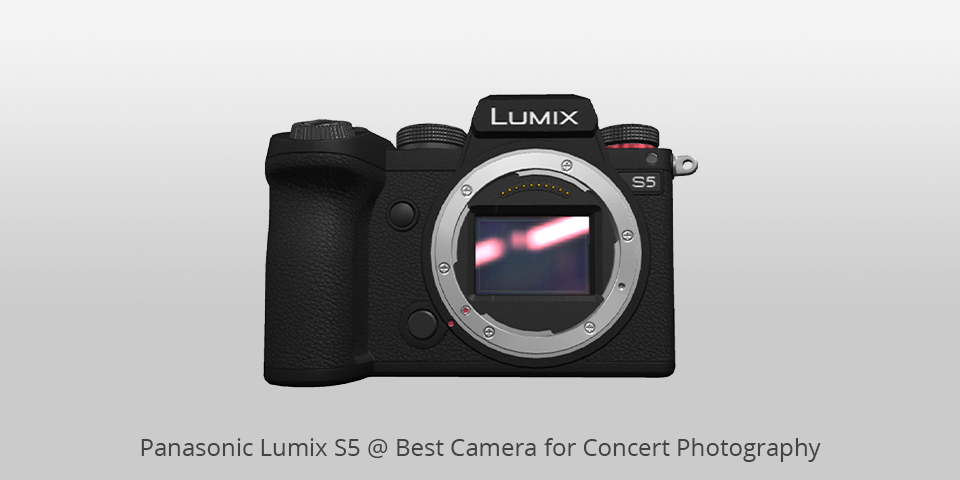
Megapixels: 24.2 MP | Screen Size: 3 in | Lens Mount: L-Mount | Video: 4K | Battery Life: 460 shots
Lumix S5 is an excellent choice for concert photography due to its incredible sensor and robust AF tracking features. These features allow you to capture dynamic action with precision. The camera also has a flip screen and dual image stabilization, ensuring steady images even in low light conditions.
This Panasonic camera also has an articulating LCD screen and built-in Wi-Fi connectivity, making it convenient for sharing your shots on the go.
I must mention that the Lumix S5 can record 4K video, but there is a 30-minute time limit. However, it does come with full V-Log capability, which is fantastic for post-processing. Additionally, the camera has fast continuous shooting speeds and a full HD slow-motion mode, giving you more options to capture the perfect shot.
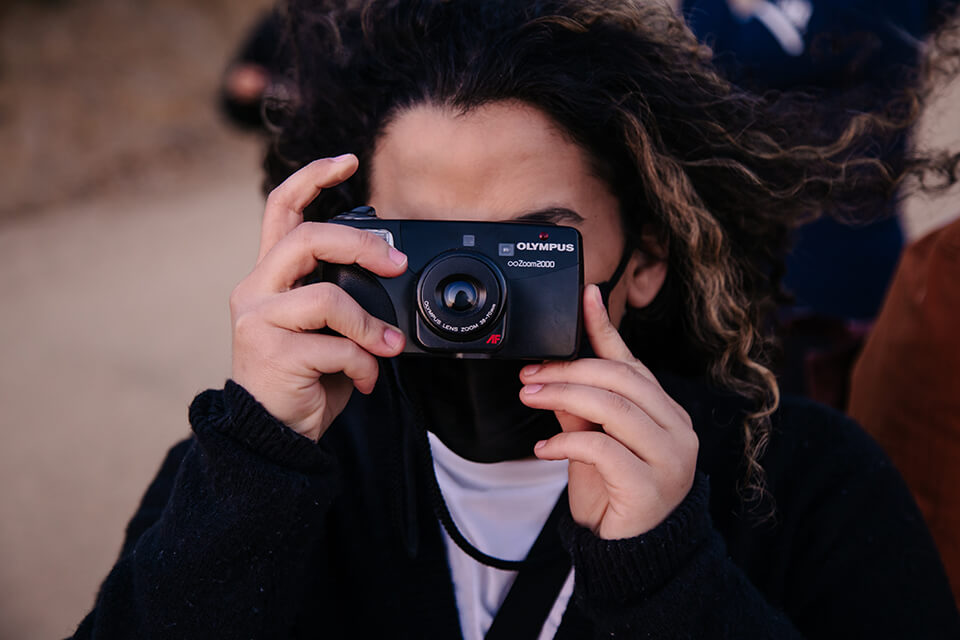
Sensor. The sensor is a crucial part of the camera that determines the image quality. For concert photography, you want a camera with a larger sensor. It helps in low-light situations and captures more details. Full-frame sensors are the gold standard, but don't worry if you can't afford that. There are other sensor sizes that can still give you great results.
ISO range. ISO range is another important factor for the best concert cameras. It measures the camera's sensitivity to light. In low-light conditions, you'll want a high ISO range so that your camera can capture enough light without introducing too much noise. Try to stay below ISO 800 to keep the noise levels in check.
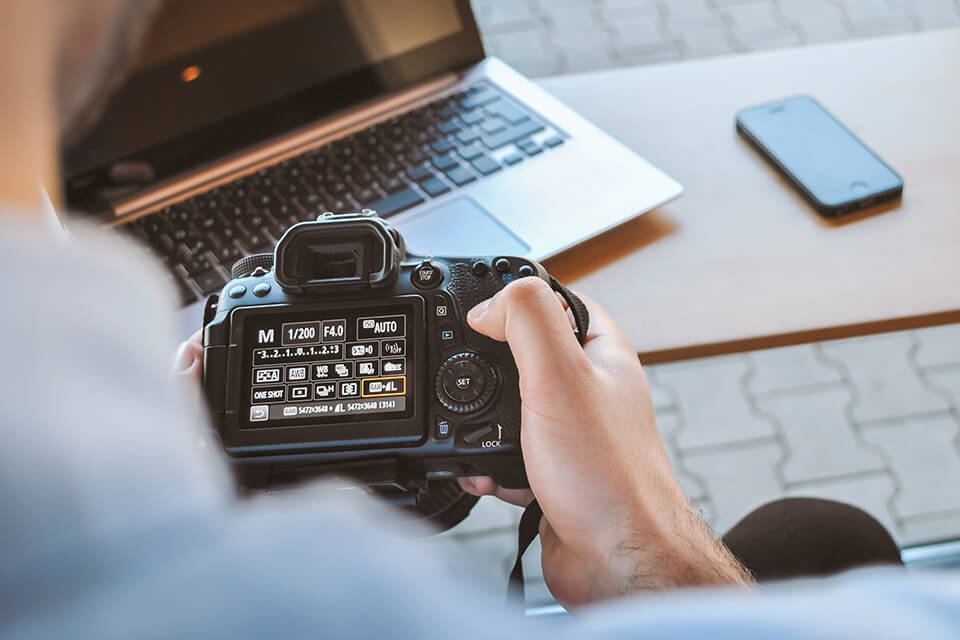
Aperture. A wider aperture allows more light to reach the sensor, resulting in better low-light image quality. It also helps you achieve faster shutter speeds to freeze fast-moving subjects. Look for cameras with a wide range of apertures to give you more flexibility.
Focus system. The shooting speed largely depends on the accuracy of the focus. Besides, the number of focus areas is an important characteristic of a reportage camera. The more focus areas a camera has, the more accurately you can focus on the desired part of the frame.
Look for a camera that excels in low-light conditions, as concerts often have challenging lighting situations. Fast autofocus and a high ISO range are essential for capturing sharp and high-quality images. Additionally, a camera with a large sensor and the ability to shoot at a high speed will allow you to capture those fast-paced moments during performances.
The camera lens you choose is equally important as the camera itself. The best lens concert photography is a fast prime one or a zoom model with a wide aperture. A fast prime lens will enable you to capture close-ups of musicians without compromising image quality, while a zoom lens provides versatility for capturing different perspectives. Carrying multiple lenses allows you to quickly switch between them as the concert progresses.
Shooting in RAW format is highly recommended for concert photography. RAW files retain more data and offer greater flexibility during post-processing. This format allows you to adjust exposure, white balance, and other settings without sacrificing image quality. It's especially beneficial when dealing with challenging lighting conditions and high contrast scenes often encountered in concert photography.
To maximize your camera's potential for concert photography, experiment with different perspectives and angles. Capture both close-ups of performers and wider shots of the crowd and stage to tell a complete story. Utilize a wide aperture to create dramatic images and make use of the available light in low-light environments. Consider using image stabilization to minimize camera shake and ensure sharp images. Additionally, having a camera with a quiet or silent mode can be advantageous, as it won't disturb the audience or performers.
If you're on a budget, the Canon EOS Rebel T7 is the best camera for concerts. It offers impressive features such as a high-resolution LCD screen, built-in Wi-Fi connectivity, and a silent shooting mode. However, there are various camera models available at different price points, so it's essential to research and compare features that align with your specific needs and budget.
When it comes to concert photography, investing in a DSLR camera is a wise choice. These concert cameras offer a wide range of lenses and superior low-light performance compared to point-and-shoot cameras. Let's take a look at the cameras from the list.
Sony a7 III is a powerful mirrorless camera that combines exceptional imaging capabilities with high-speed performance. Its autofocus system is impressive, rivaling even flagship models. Sony Alpha 7R IV offers advanced autofocus system make it a versatile tool for concert photography.
If you’re a Canon user, Canon EOS 5D Mark IV is the best camera for many photographers due to its high-quality full-frame image quality at an excellent price. Canon EOS Rebel T7 is an entry-level DSLR and is great camera for amateur photographers or those on a tight budget.
Nikon D7500 and Nikon D500 are a top-quality APS-C DSLR that strikes a great balance between complexity and ease of use. Both offers excellent speed and low-light performance.
Fujifilm X-T30 II is most compact mirrorless camera with impressive image quality and a wide range of features. Panasonic Lumix S5 is a mirrorless camera that excels in both still photography and video recording.
The best camera for concert photography will depend on your specific needs and budget. Consider factors such as low-light performance, autofocus capabilities, and the availability of compatible lenses. Ultimately, choose a camera that suits your shooting style and helps you capture those unforgettable moments during concerts.